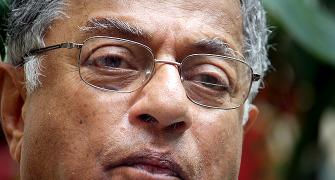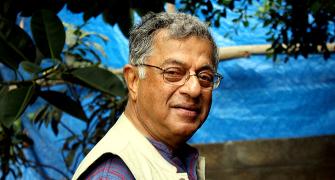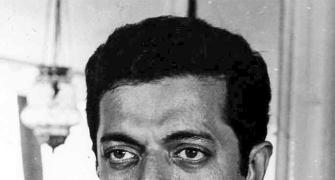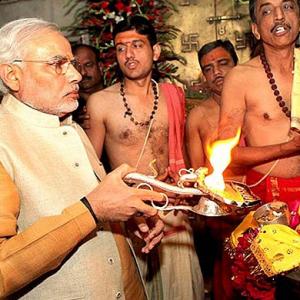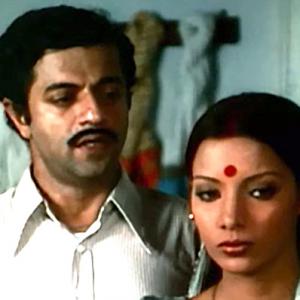'He had a continuing interest in life, people, and the society in which he lived,' remembers Shyam Benegal, who collaborated with the polyglot playwright and actor through the 1970s and remained his friend for more than five decades.
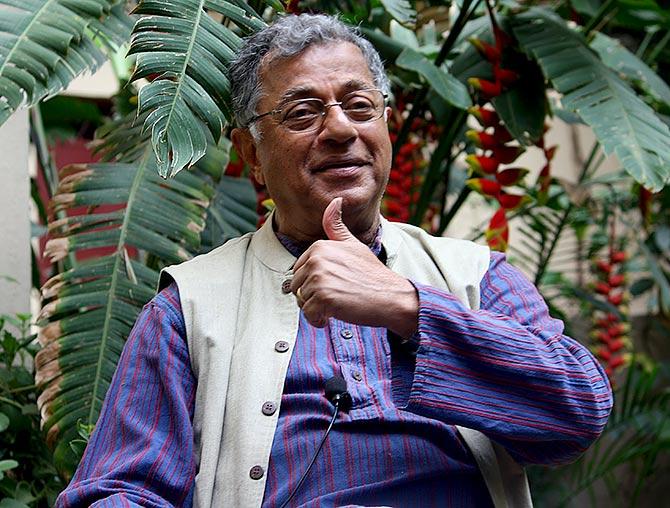
Even after a busy day of palling around, when people headed home to sleep, Girish Karnad would stay up and write.
In fact, much of his writing was done at night. The master Kannada playwright was blessed also with a supernatural ability to concentrate in circumstances far from the ideal.
"He could be in the middle of a railway station but nothing could disturb his ability to concentrate on what he was thinking or writing. He could calmly keep all the hustle and bustle out of his mind," says Shyam Benegal, who as a long-time friend and collaborator observed this discipline up close.
"It was something I was highly envious of. It seemed so special to me."
When Karnad passed away in Bengaluru, Benegal was among the first to be informed.
The previous evening Karnad had been surrounded fortuitously by family -- including siblings, children, niece and grandchildren -- some of whom had been in the city to attend a wedding.
Nobody had suspected he would breathe his last the next morning.
Benegal missed the simple, private funeral Karnad's family chose to have because he could not arrange travel that would get him to Bengaluru in time.
Having had some time to come to terms with the loss, the director speaks about their shared memories in his Tardeo office in Mumbai, covered in books and film posters.
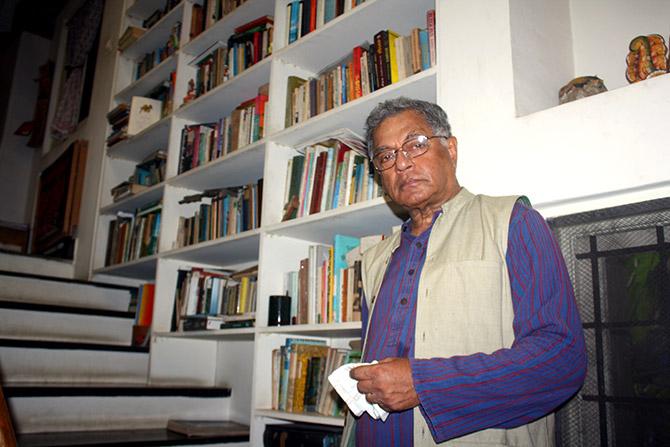
In some ways, it seems ordained that Benegal and Karnad should have teamed up.
They lived through the promise and failings of Nehruvian modernity in the post-Independence period.
Both prominent young artistes produced early works evaluating the government of the day, and addressing issues of caste, class and the place of women in society.
The period at the end of the 1960s and the beginning of the 1970s was characterised by the emergence of a fresh crop of talent and a welcoming audience.
"It was a great flowering time for the arts and Girish was one of the leading lights." Benegal cast Karnad as the lead in his second and third films, the powerful rural dramas Nishant (1975) and Manthan (1976).
They jointly won a National Award for the screenplay of Bhumika (1977), based on the life of actress Hansa Wadkar.
The director had initially heard about Karnad through a cousin, the late Krishna Basaruru who grew up in the same neighbourhood in Dharwad and attended Karnatak College with him.
Basaruru would later join Karnad in his filmic experiments as a co-writer for the Kurosawa-esque warrior epic Ondanondu Kaladalli (1979) and the saucy adaptation of a 5th-century classical drama, Utsav (1984).
"Girish had the reputation of being a very brilliant student and a wonderful debater, and an 'all-round hero' since he was very young," says Benegal, breaking into a smile.
When Karnad won a Rhodes Scholarship to go to Oxford University, the two met briefly for the first time in Bombay (now Mumbai), where Benegal had just arrived to make a career as film-maker.
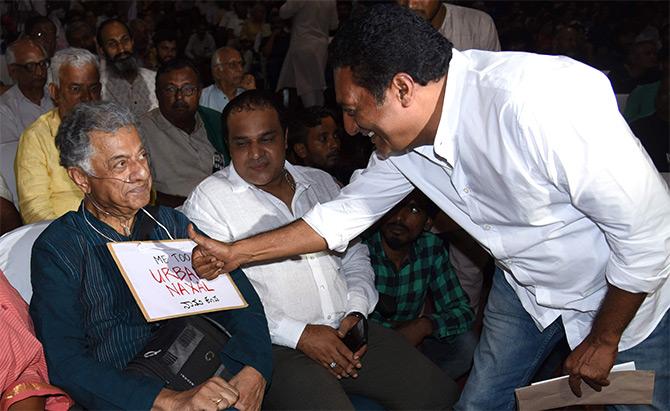
In England, too, where he studied philosophy, politics, and economics, Karnad became a star student, the president of the Oxford Union.
It was Kannada theatre, however, that was his calling, owing perhaps to his formative years in Sirsi, a hub for traditional Yakshagana and touring drama companies.
The contemporised imagining of historical characters is said to have taken Kannada literature in an exciting direction, winning him the Jnanpith Award.
In his early 20s, he wrote Yayati about the tensions between father and son, and followed it with Tughlaq, which was seen as a critique of Nehruvian socialism. More mythological plays -- Hayavadana and Nagamandala -- came next, as did a chance to make Kannada films.
Benegal enlisted Karnad for his scripting strengths, too. "He had this 'chess player's mind'.
He could pick out the dramatic moments in any kind of narrative, and see how they could have a proper beginning, middle, and end."
This perfectly complemented his own skill of characterisation.
In both Nishant and Manthan, Karnad played a decent young man arriving in testing rural environments, and struggling to adapt.
"The role he played was not him, of course, but it came naturally to him because temperamentally he was like that," says Benegal.
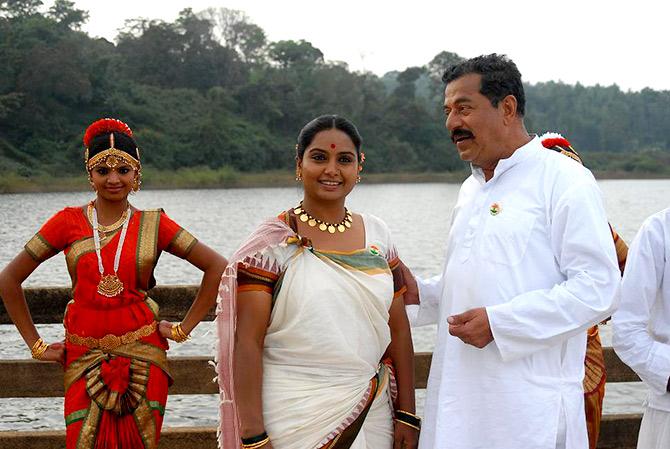
Although he largely guarded his private life, to those with whom he was friendly, "he was a very affectionate person".
Karnad had once mentioned in an interview that growing up around many women had shaped Benegal's and his often-empathetic writing of female characters.
The film-maker receives a number of calls during our interview, including one from Kulbhushan Kharbanda, another contemporary who had been closely associated with the works of both Karnad and Benegal.
He reminisces fondly about their departed friend for a few minutes before hanging up.
They were drawing from a common pool of talent in those days.
Where Karnad offered a break to Kannada actor Shankar Nag in his Ondanondu Kaladalli, and brought him to Hindi cinema with Utsav, Benegal cast his brother Anant Nag in several films.
Even at times when he was broke, Karnad is known to have been generous.
"If he had a bit of money in his pocket, he never stinted on his friends and colleagues," recalls Benegal.
Theatre not being particularly lucrative, he worked very hard for what he got.
It was once again inner discipline, Benegal reckons, that allowed his friend to do rather well.
As also later the contribution of Saraswathy Ganapathy, his doctor-wife with whom he raised two children.
Benegal's creative association with Karnad halted when the latter returned to Bengaluru.
Conversations between the duo were in their shared mother tongue, Konkani, the subtle difference being that Karnad spoke in the badgi style unique to North Canara, while Benegal has a South Canarese tenki influence.
In being able to learn languages quickly, Karnad had another sought-after gift.
He wrote in Kannada, expertly translated his own plays into English, and acted in several languages including prominently Hindi and Marathi films.
During his administrative stint at the Film and Television Institute, first as its youngest director at 35 and later chairman, Karnad is said to have faced some of the most serious strikes but nevertheless effected transformative changes in nearly every sphere of cinema education there.
"Sometimes students get used to the idea that you're not there to educate yourself but you're there as a club. He wasn't going to have any of that," chuckles Benegal, who also served as FTII chairman a few times.
In recent years, Karnad performed remarkable acts of protest such as contesting the celebration of author V S Naipaul or disputing the curbing of artistic and journalistic freedoms.
At a convention last year, he wore a sign that read 'Me Too Urban Naxal' to mock the moniker that rightist groups had coined for intellectuals whose views they disagreed with.
It also came to light last year that he had been on a hit list for having opposed hardline Hindutva.
"He became more and more committed that way as he grew older, and as the politics in Karnataka became toxic," says Benegal.
Ultimately, Karnad's art and activism reveal one thing to the director. "He had a continuing interest in life, people, and the society in which he lived."


